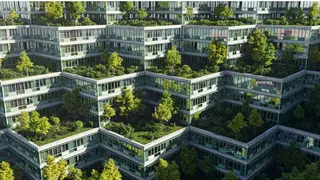An afforestation programme of nearly 7 lakh acres that supports a large paper mill and possibly supplies to others too; a watershed initiative spread over 8,70,000 acres across 14 States, and nearly 43 per cent of energy met through renewable energy — all these set ITC Ltd apart.
For a multi-business player that has presence in several segments, including FMCG, hotels, paperboards and packaging, agri-business and information technology, the bottom line is not just about profit and loss.
It is about ensuring shareholders’ profit, taking along its stakeholders, and fulfilling a responsibility towards people and the planet.
Describing itself as a company that delivers a “triple-bottom-line,” ITC, which logged ₹67,000 crore in gross sales value and profit after tax of ₹11,200 crore in the financial year 2018, traces its more than 15-year journey in sustainability and benchmarks itself in accordance with Global Reporting Initiative standards. As a diversified business major, it is investing about ₹25,000 crore over the next few years and aims to achieve a turnover of ₹1,00,000 crore in its FMCG business by 2030.
According to Chairman YC Deveshwar, ITC is the only enterprise in the world of comparable dimensions to be carbon-positive 13 years in a row, water-positive for 16 consecutive years and solid waste recycling positive for the last 11 years.
In the company’s Sustainability Report for 2018, the Chairman points towards total shareholder returns growing at a CAGR of over 22 per cent, “reflecting benchmark efficiency in serving financial capital”.
Managing Director Sanjiv Puri calls ITC an “Enterprise of Tomorrow” that brings transformational change by making societal value creation a conscious strategic decision and not one that banks on corporate conscience alone.
“This belief has spurred ITC to craft innovative strategies that orchestrate a symphony of efforts aimed at enriching the environment, creating sustainable livelihoods, empowering local communities and addressing the challenge of climate change.”
A number of elements and extensive work have gone into achieving this, including setting up 23 platinum-certified green buildings and creating 6 million livelihood opportunities through its businesses and value chain. Its rural retail segment, e-choupal, has become a case study at the Harvard Business School.
The company, served by over 200 factories, says it has pursued multiple drivers to achieve 19-fold growth in ITC’s non-cigarette business since 1996. Now the portfolio accounts for over 80 per cent of its operating capital employed and 90 per cent of its employee base.
Being engaged in paper production, which is both energy, water-intensive, and considered a polluting industry, ITC has taken up largescale afforestation. The company also does intensive watershed development in 42 districts and has begun work on water stewardship in select areas in Madhya Pradesh, Maharashtra, Tamil Nadu, Telangana and Karnataka, informs S Sivakumar, Group Head, Agri and IT Businesses. And to upscale its impact, ITC is seeking to attempt something bigger and has taken up water basin studies for five river basins and may orchestrate initiatives in some basins.
Chitranjan Dar, Group Head, Sustainability, Projects and R&D, says “we focus on reducing energy and water footprint right from the design stage. We expect to up our renewable energy use from 43 per cent to 50 per cent in the near term.”
The company is proud of its consumption savings. Fuel oil consumption has been brought down by 50 per cent in biscuit production while water use in the paper plant at Bhadrachalam has been brought down from 60 cubic metres per tonne to 37 cubic metres per tonne. About 25 MW of power is also generated from bio-waste.
For ITC, it is a carefully scripted journey whose objective is not just shareholder return but to do good to the community, emphasises Sivakumar.








Comments
Comments have to be in English, and in full sentences. They cannot be abusive or personal. Please abide by our community guidelines for posting your comments.
We have migrated to a new commenting platform. If you are already a registered user of TheHindu Businessline and logged in, you may continue to engage with our articles. If you do not have an account please register and login to post comments. Users can access their older comments by logging into their accounts on Vuukle.